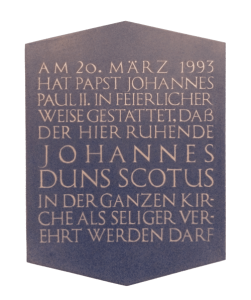 Blessed John Duns Scotus is liturgically remembered today but because it is Sunday his memorial is skipped this year. Sad really. As you know, Blessed John was born in Scotland in 1266, studied and taught in London and Paris and spent the end of his life in Cologne having died in 1308. His sarcophagus in the Minoritenkirche. At Scotus’s sarcophagus is the plate showing us that he was declared to be “blessed” when John Paul II visited Cologne.
Blessed John Duns Scotus is liturgically remembered today but because it is Sunday his memorial is skipped this year. Sad really. As you know, Blessed John was born in Scotland in 1266, studied and taught in London and Paris and spent the end of his life in Cologne having died in 1308. His sarcophagus in the Minoritenkirche. At Scotus’s sarcophagus is the plate showing us that he was declared to be “blessed” when John Paul II visited Cologne.
Blessed John is widely known as the high point of medieval philosophy. Martin Heideggers did his second doctorate to teach in the university (the “Habilitationsschrift”), on a topic from the philosophy of John Duns Scotus. The modern era of philosophy is credited for being full of errors, especially for the errors of modernity (the univocity of being). Blessed John seems to be at the heart of the controversy.
Philosophically, I remember Scotus for two things: 1.) his exposition on the Blessed Virgin Mary and 2.) haecceitas.
It was his work, the year before his death, on the Virgin Mary that led the Church under Pope Pius IX to define the dogma of the Immaculate Conception.
On this second point develops a theory of haecceitas, or this-ness –the metaphysical cause of individual being. Haecceitas speaks to what makes this rhubarb (or cat or dog or human being) different from that other plant (or car or dog or human being). This metaphysical cause was picked up by Jesuit Father Gerard Manly Hopkins in his poetry.
At any rate, Blessed John’s philosophy is not what he’s liturgically remembered for, it is his holiness of life. Let us pray that Blessed John Duns Scotus mediates for us before the Throne of Grace.